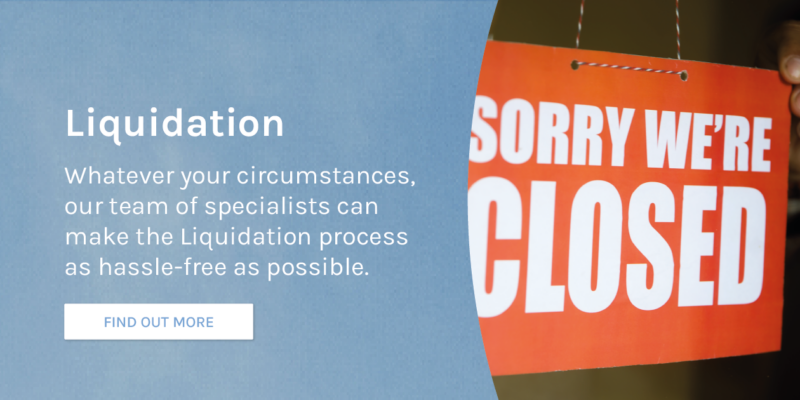Are you weighing up the difficult decision of whether liquidating your limited company is the correct move or not? As a director, getting to grips with the liquidation process, and understanding exactly what it requires is vital.
The task of liquidating your limited company should not be taken lightly. The weight of this decision can be overwhelming. It can have a knock-on effect on company directors, shareholders, creditors, and any other stakeholders involved in the business. As a director, it’s important that you plan ahead and prepare for this often complex, highly stressful process.
At the end of the day, liquidating your business is a highly involved process with a number of moving parts. Things can be missed which could have a knock on effect on the life of your employees, creditors, and shareholders. It could even have a serious impact on your life going forwards.
Read on to learn more about the following and more:
- The primary factors that will determine which liquidation method is right for you
- What these methods entail
- The difference between operating solvently and insolvently
- What your legal obligations are when liquidating a limited company
- Potential tax implications of liquidation
- What could happen to employees
Is Your Company Solvent or Insolvent?
If you’re considering liquidating a limited company that you either own or are a director of, it’s vital that you know whether your business is operating solvently or not. Solvent refers to when a company is able to pay all of its debts, insolvent is when it has more liabilities than assets and is unable to address this balance.
Determining if your company is solvent or insolvent from the outset will save you a lot of time later. Your firm’s solvency will ultimately determine how you can close it. If you are unsure, you may want to consider contacting a specialist who can help. Alternatively, there is a company solvency test you can undertake to find out for yourself.
Implications of Solvency/Insolvency
The implications of your company being solvent or insolvent are as follows:
Solvent
- If your company is operating solvently, you will have a great deal more flexibility when it comes to choosing the best choice of actions for you. Solvent businesses will have the ability to consider options beyond liquidation should they wish, including business restructuring, refinancing, or coming to an agreement with creditors.
- A solvent business will be able to better maintain positive relationships with suppliers and lenders. It will afford you more favourable credit terms, financing options, and gives you a much stronger negotiating position.
- Unlike an insolvent company, directors of a solvent business are able to much better plan for the long-term, without the immediate stress of needing to resolve your situation as quickly as possible.
- When your situation is not as financially dire, the value of your assets can be better maintained. This will ensure that your assets will be worth much more.
- A director of a solvent company is much less likely to be exposed to the dangers of personal liability.
Insolvent
- Any director who continues to trade while the company is insolvent, leaves themselves vulnerable to potentially being held personally liable should there be any increase to company debts during this period of activity.
- Company creditors will gain increased input when a business is insolvent. They can gain the impetus to seek legal methods to recover their outstanding debts via the courts.
- As highlighted above, insolvent companies are often limited in what they can do. Their decisions are restricted to things that can help the immediate financial obligations.
What Are Your Liquidation Options?
There are three types of liquidation available to you. These are a creditors’ voluntary liquidation where you cannot pay debts and involve creditors during liquidation, compulsory liquidation, your business cannot pay its debts and applies to the courts for liquidation; and members’ voluntary liquidation, this occurs when you can pay all debts but you want to close.
Choosing the right liquidation method for you and your situation is pivotal. You must consider the financial health of your business, existing liabilities, what goals you have for the future, and much more when attempting to ascertain which liquidation technique is best for you.

The different liquidation options are:
Creditors Voluntary Liquidation (CVL)
Often the final attempt for a business to repay its creditors. A Creditors’ Voluntary Liquidation (CVL) is a process that is initiated by an insolvent company in order for them to attempt to wind up their affairs prior to closure.
CVS’s are initiated by companies in significant financial distress, whose directors are looking to wind up their affairs prior to closure.
In the Creditors Voluntary Liquidation process, directors are legally required to convene a shareholders’ meeting to pass a resolution for liquidation.
The successful passing of this resolution marks the beginning of a journey that also requires directors to notify creditors by holding a meeting for them. It is during this meeting that the creditors will also approve a liquidation, as well as the appointment of an insolvency practitioner to assume the official role of the liquidator.
The liquidator is the most important person in the process. They undertake a majority of the responsibilities during the process, including selling company assets and distributing all funds raised to the creditors in the agreed order of priority. Once this meticulous process is complete, the company will be officially dissolved.
Compulsory Liquidation
Initiated by creditors (or the courts) when a company is unable to pay its debts and other solutions have been exhausted. During the process, creditors must apply to the court for a winding up petition and then upgrade to a winding-up order should the debts still remain unpaid. This then leads to the appointment of an insolvency practitioner to act as liquidator.
The liquidator is responsible for controlling the company during liquidation, selling assets, paying creditors, and ultimately dissolving the business.
Members Voluntary Liquidation (MVL)
MVLs are reserved for solvent companies looking to shutter their operations of the owners/directors volition. To do so, directors must declare that the company can pay all debts within one year, and all shareholders must pass a resolution for liquidation.
An insolvency practitioner will then oversee the process to ensure that all debts are settled and any funds remaining are distributed among shareholders in accordance with their rights. MVL is common in situations where the firm’s shareholders wish to retire or move on from the venture to something new.
Business Restructuring
While not technically a liquidation method, business restructuring is a similar solution a company director can undertake if they are struggling financially.
Business restructuring refers to the process whereby a business makes a number of significant changes to its structure, operation, or financial arrangements in order to improve performance and make the operation more efficient.
Restructuring can go a long way towards improving financial position and can provide an excellent foundation to set your firm on a more positive, hopeful path going forwards.
Company directors faced with ever-increasing debts that they cannot repay on time will often consider a restructuring so that they can come up with a way of repaying creditors and paying off all debts without jeopardising the future of the business they spent years building up.
You’re Liquidating a Limited Company: Other Questions to Ask
If you’re considering liquidating a limited company, there are a number of things that, as director, you need to consider. You will need to assess the company’s financial situation, check your legal obligations, consider employee rights, comply with reporting requirements, and much more.
Here are just a few of the essential things a director weighing up liquidating a limited company may wish to consider:
What Are Your Legal Obligations?
The director of a company has a fiduciary duty to act at all times in the best interests of their business, as well as all of its shareholders and creditors.
The most common way directors breach their fiduciary duties is when they trade wrongfully. This requires them to, with clear forethought and knowledge of their situation, continue to operate and trade despite there being absolutely no reasonable prospect of avoiding liquidation and repaying creditors.
In this situation, the creditors could find themselves owed even more money that they are now guaranteed not to receive. A director found to have acted in this manner could find themself personally liable for the debt incurred.
How Much Are Your Assets Worth?
If you know that liquidation is inevitable, perhaps it’s worth considering having an inventory done of all of your company’s assets?
Getting assets valued by an expert can help you to maximise the value of them when it comes to the actual liquidation process.
Assess Your Existing Contracts and Relationships
It is important that you review and put an end to all existing contracts, leases, and agreements your business might have entered into prior to liquidation.
You should notify your suppliers, landlords, and any other party you may have entered into a professional relationship with that you will be entering into liquidation.

What Will Happen to Employees?
Amidst the stressful and complex liquidation process, it’s important to also remember the human aspect, your employees. It can be very easy to focus exclusively on the company itself when liquidating a limited company. However, as director of the company you also have a moral and professional duty to your staff. You should handle this aspect of the liquidation with the utmost sensitivity and professionalism.
You should try to keep them in mind at all times. First you should notify your employees about the ongoing situation. It is at this stage that you should address any concerns they might have, and provide them as clear an outline as you have of the immediate and long-term impact it will have on them.
Transparent communication is vital in the name of maintaining trust during what is sure to be an incredibly stressful time for your team. During this period, you may wish to explore options for what you can do to assist your employees. Things you can consider include:
- Transition support
- Severance packages
- Facilitate them in searching for new employment opportunities
In addition to what will happen to your employees, you should also address pension obligations and what their rights and options are. You may want to consider consulting with pension trustees and administrators to ensure that you are complying with all pension regulations.
For more information about what will happen to employees when a company goes into liquidation, check out our dedicated blog on the subject.
What are the Tax Implications of Liquidating?
It may be prudent to consider the tax implications of liquidating for both the directors and the company itself. It’s essential for directors to seek advice from a professional to ensure that the company and all directors have fulfilled their tax obligations, as well as helping them make more informed decisions to minimise future tax liabilities.
Are You Complying With Reporting Requirements?
In order for you to comply and properly navigate the wide array of necessary requirements you must meet requires attention to detail. You must complete a number of tasks, from filing the standard documents to meeting all deadlines set on-time.
The most important requirement you must meet though, is making sure you properly and correctly submit your documents and reports with Companies House.
Any oversights or mistakes at this stage would result in unnecessary and unwanted delays. Completing this stage correctly will be important to steer your liquidation towards a smooth resolution as fast as you can.
Maintain Records
It is important that you maintain thorough and accurate records of every single course of action undertaken during the liquidation process.
This is important to ensure that you have complied, and continue to comply, with all legal requirements.
Liquidation Advice You Can Trust
When liquidating a limited company, the stakes are incredibly high, and the potential knock-on effects are huge. As you continue on this journey, it’s important to remember that you do not need to, and should not, tackle it alone.
Navigating the multitude of complexities that come with liquidating a limited company requires a great deal of careful thought and professional guidance. Seek the counsel of professionals who specialise in navigating these particular complexities.
At Inquesta, our team of insolvency professionals boast years of experience in guiding business owners and directors through the difficult company insolvency process — making us perfectly placed to help and support you too.
Enlisting the expertise and knowledge of these experts ensures that you’re not only safeguarding the interests of yourself and your fellow owners/directors, but your employees, creditors, and any other stakeholders involved in your firm.
As you get started down this road, understanding your position is vital. The assistance of Inquesta’s team of licensed insolvency experts will ensure that you can comply with each and every obligation expected of you, and make more informed decisions for your future.
With an expert in your corner, you can much more easily navigate the process, safeguarding the interests of all stakeholders, and move forward with assurance.
The team at Inquesta are specialists in our field. We have decades of experience supporting business owners in all aspects of company insolvency. From administration to company voluntary arrangements and beyond.
When it comes to liquidating your company, you don’t need to act alone. Our dedicated insolvency team is on hand to guide you each and every step of the way. Contact us for more information. Alternatively, download our free comprehensive guide to liquidating your company today.




